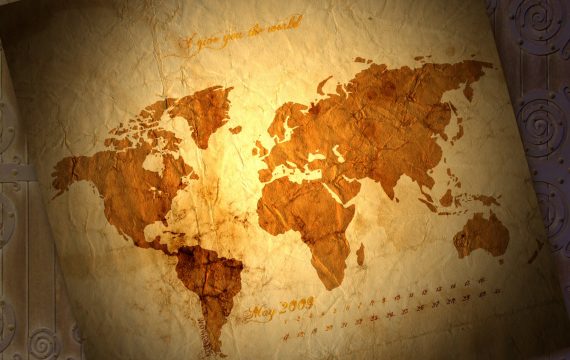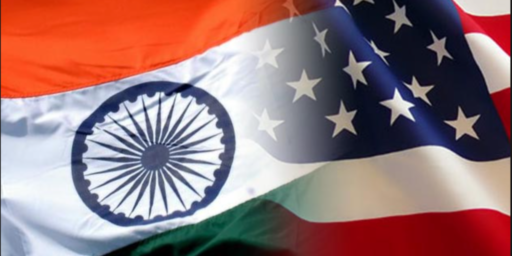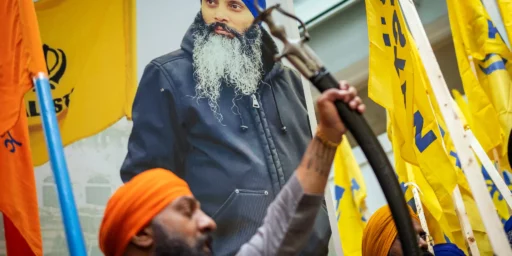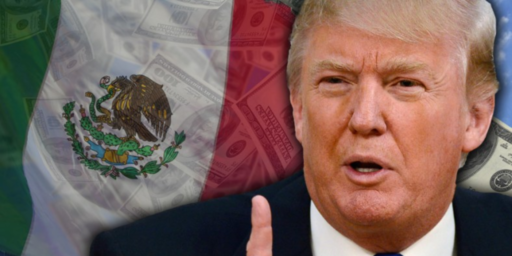Three Elections
Voters in Mexico, India, and South Africa are making their voices heard.

Several Reuters reports highlight democratic contests ongoing in three important countries.
Mexico
“Mexicans vote in election seen crowning first female president“
Mexicans will vote in national elections on Sunday with the ruling party candidate, Claudia Sheinbaum, commanding a hefty lead in the polls and expected to become the country’s first female president.
Sheinbaum’s mentor and popular outgoing president, Andres Manuel Lopez Obrador, has loomed over the campaign, seeking to turn the vote into a referendum on his political project that Sheinbaum, a leftist, has vowed to continue.
“We already won the campaign, we already won the debates and now we have to win the election to consolidate the continuity of the national project,” 61-year-old Sheinbaum, a trained physicist and former Mexico City mayor, said as she wound up her campaign.
Sunday’s elections are the biggest in Mexico’s history, with voters electing about 20,000 posts. The contest has been marred by violence with 37 candidates murdered during the campaign, the most in the country’s modern history, stoking concerns about the threat of warring drug cartels to Mexico’s democracy.
Polls have consistently placed Sheinbaum about 20 percentage points ahead of her closest challenger, Xochitl Galvez, a businesswoman and senator who heads an opposition coalition comprised of the Institutional Revolutionary Party (PRI), which ruled Mexico for about seven decades until democratic elections in 2000, the right-wing PAN, and the leftist PRD party.
Either women’s victory will be heralded as a major step in Mexico, becoming the first female leader in a country often criticized for its macho culture.
The winner will face formidable challenges, especially how to tame organized crime violence that contributed to more than 185,000 people being murdered since Lopez Obrador took office in Dec. 2018.
That violence, along with electricity and water shortages, is a problem as Mexico attempts to persuade manufacturers to relocate as part of the nearshoring trend, in which companies move supply chains closer to their main markets.
The winner will also have to wrestle with what to do with Pemex, the state oil giant which has seen production decline for two decades and is drowning in debt.
Both candidates have promised to expand welfare programs, which could be a challenge amid a large deficit this year and sluggish GDP growth of just 1.5% expected by the central bank next year.
India
“Modi’s alliance to win big in India election, exit polls project“
Indian Prime Minister Narendra Modi’s Bharatiya Janata Party (BJP)-led alliance is projected to win a big majority in the general election that concluded on Saturday, TV exit polls said, suggesting it would do better than expected by most analysts.
Most exit polls projected the ruling National Democratic Alliance (NDA) could win a two-thirds majority in the 543-member lower house of parliament, where 272 is needed for a simple majority. A two-thirds majority will allow the government to usher in far-reaching amendments in the constitution.
A summary of five major exit polls projected the NDA could win between 353 and 401 seats, a number that is likely to boost financial markets when they reopen on Monday. The NDA won 353 seats in the 2019 general election, of which BJP accounted for 303.
[…]
Exit polls, which are conducted by polling agencies, have a patchy record in India as they have often got the outcome wrong, with analysts saying it is a challenge to get them right in the large and diverse country.
In his first comments after voting ended, Modi claimed victory without referring to the exit polls.
“I can say with confidence that the people of India have voted in record numbers to re-elect the NDA government,” he said on X, without providing evidence of his claim.
“The opportunistic INDI Alliance failed to strike a chord with the voters. They are casteist, communal and corrupt.”
[…]
The opposition dismissed the exit polls, and ahead of their publication had called them “prefixed”. Most opposition parties accuse India’s main news channels of being biased in favour of Modi, charges the channels deny. They also say exit polls in India are mostly unscientific.
[…]
Nearly one billion people were eligible to vote in the seven-phase election that began on April 19 and was held in scorching summer heat in many areas.
The Election Commission will count votes on June 4 and results are expected the same day.
A victory for Modi, 73, will make him only the second prime minister after independence leader Jawaharlal Nehru to win three consecutive terms.
Modi began his re-election campaign by focusing on his achievements over the last 10 years but soon switched to mostly targeting the Congress by accusing it of favouring India’s minority Muslims, which the opposition party denies.
The opposition has largely campaigned on affirmative action programmes and saving the constitution from what they call Modi’s dictatorial rule, an allegation the BJP denies.
Unemployment and inflation are the main concerns for voters in the majority-Hindu country of 1.4 billion people, surveys have said.
South Africa
“South Africa’s coalition talks set to start after ANC loses majority“
Official results from South Africa’s election were expected to confirm on Sunday the end of the African National Congress’ 30 years of majority governing and start the clock on a race to form a new ruling coalition.
Voters, angry at joblessness, inequality and power shortages, slashed support for the ANC – the former liberation movement of the late Nelson Mandela – to 40% in Wednesday’s election, down from 57.5% in the 2019 parliamentary vote.
That means it must now share power, likely with a major political rival, in order to keep it – an unprecedented prospect since the end of white minority rule in 1994.
[…]
“The ANC is committed to the formation of a government that reflects the will of the people, that is stable and that is able to govern effectively,” Fikile Mbalula, the party’s secretary general, said at a press briefing on Sunday.
He said the ANC would be having discussions both internally and with other parties to create national and provisional governments “that reflect the will of the people and that are able to take the country forward”.
However, he said that the ANC would not bend to pressure from other parties that incumbent President Cyril Ramaphosa must step down as a condition for forming a coalition.[…]
Before Wednesday, the ANC had won every national election by a landslide since 1994, but over the last decade its support has dwindled as the economy stagnated, unemployment rose and roads and power stations crumbled.
The main opposition party, the Democratic Alliance (DA), had 21.8% of votes in last week’s election. uMkhonto we Sizwe (MK), a new party led by former President Jacob Zuma, managed to take 14.6%, doing most of the damage to the ANC.
The far-left Economic Freedom Fighters (EFF), led by former ANC youth leader Julius Malema, got 9.5%.
Both the DA and the small Inkatha Freedom Party said their leadership would meet separately on Sunday to discuss their next steps.
“Africa’s potential kingmakers struggle with white image“
Looking out of his window at Cape Town’s False Bay, Nick Searra acknowledges that things do work better in South Africa’s second biggest city, a stronghold of the opposition Democratic Alliance (DA).
But that doesn’t mean he is ready to see the party or its 48-year-old leader John Steenhuisen running the rest of the country.
“Imagine an old white man as the president of South Africa,” said Searra, a 44-year-old white Johannesburg native who moved to Cape Town in 2022.
In a seismic shift, voters this week dismantled the majority which the African National Congress (ANC) has held since the end of white minority rule in 1994, leaving the party of the late Nelson Mandela little choice but to seek a coalition with a major rival.
Despite their own lacklustre performance, an improvement of just one percentage point from the last vote in 2019, the DA and Steenhuisen suddenly find themselves in an unprecedented position.
The ANC remains the largest party despite the damage done by an upstart rival led by former President Jacob Zuma, and is therefore expected to retain the presidency.
But as the second biggest political force with 21.8% of votes, the DA is one of three parties with the clout to help it form a new majority and potentially shape the future of the nation.
“We’ve said for the last 30 years that the way to rescue South Africa is to break the ANC majority. We’ve done that,” Steenhuisen said as the outcome of Wednesday’s vote became clear.
Yet in a country with a painful history of codified racism – apartheid – where white South Africans make up just 7% of the population, the DA is struggling to shake off an image as a party of rich whites and prove it reflects the make-up and aspirations of all.
For political analyst Melanie Verwoerd, the problem is as much ideological as racial.
Steenhuisen, a champion of economic liberalism, has vowed to end a racial quota system for employers established by the ANC to redress decades of apartheid discrimination and wants to loosen labour laws.
And, in a country of 62 million people where 24 million survive on welfare, he is pushing for a smaller role for government.
“I don’t believe that they set out to be a party of white privilege,” said Verwoerd. “But they end up being that.”
While I’m by no means an expert on any of these countries, I’ve paid attention to their politics for three decades or more and find the twists and turns interesting.
Mexico has become considerably more democratic over the time I’ve paid attention. Elections are much freer and fairer. The violence is mostly a function of criminal cartels seeking to protect their turf rather than political partisans.
For most of its post-Revolution history, Mexico was governed—some might even say ruled—by the PRI and its antecedents. It was a statist party with no discernible ideology other than maintenance of its own power. Yet, despite corruption, sometimes violent repression, and other anti-democratic practices, it was relatively popular. It was finally ousted by Vicente Fox’s National Action Party in 2000 and kept power for two terms before another PRI president, Enrique Peña Nieto won election. AMLO’s leftist-populist National Regeneration Movement won the 2018 election and looks to retain power. Mexico limits its presidents to a single six-year term.
I find India harder to pigeonhole. In many ways, it, too has become more democratic. In my youth, it seemed like political assassination was almost normal there. And the Congress party dominated the scene for most of its post-independence history. At the same time, Modi has radially lessened the power of the non-Hindi minority. This has been wildly popular and is therefore democratic in the sense of following the will of the majority but not in the sense of “liberal democracy.”
Those of us of a certain age witnessed the birthplace of a truly democratic South Africa with the lifting of the apartheid regime that rendered the majority population second-class citizens. Once national hero Nelson Mandela left office, though, his successors have struggled mightily to chat an effective course.
The country has remained truly democratic, with free and fair elections. But the ANC has both dominated the scene because of its central role in ending apartheid and struggled to offer a coherent policy platform in its aftermath.






What Modi is doing is dangerous as hell. He’s dehumanizing non-Hindus and turning a blind eye to violent religious persecution that could get very much worse, very quickly. See: Rwanda 1994-5. And we will say nothing about it because we need India to be the not-China, and we need their navy patrolling the Indian Ocean. It’s back to the Cold War, kids, when we embrace scumbags to counter greater scumbags.
@Michael Reynolds:
Run, Manchin, run!
@DK: Nice! Points for speed!
I tried to vote today.
The polling place is inside a gated community under 600 meters from my apartment (we live outside it). I could easily walk there, but my mom can’t. So I drove her there, but there was no place to park inside, or for that matter outside. I wound up leaving her at the head of the line (seniors and those with disabilities get to cut in line), then drove around for 15 minutes or so, picked her up, and returned her home.
I’ll walk to the polling place later, after I’m done cooking.
Well, I voted.
First off, 500 meters with 2/3 on a steep slope are not that easy to walk…
I got ballots for five (5) races: president, senator, deputy (equivalent to the House). municipal president (equivalent to mayor), and the local assembly. On the first thre I voted for Galvez, the common candidate of three parties in decline (PAN, PRI, PRD). For municipal president, I voted the PRD candidate. They don’t stand a chance, but I thought they’d appreciate the vote.
Galvez will most likely lose to Sheinbaum. The polls weren’t even close.